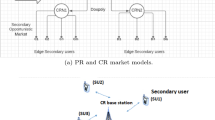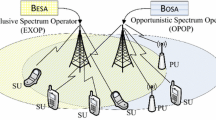Abstract
Efficient resource allocation is one of the key concerns of implementing cognitive radio networks. Game theory has been extensively used to study the strategic interactions between primary and secondary users for effective resource allocation. The concept of spectrum trading has introduced a new direction for the coexistence of primary and secondary users through economic benefits to primary users. The use of price theory and market theory from economics has played a vital role to facilitate economic models for spectrum trading. So, it is important to understand the feasibility of using economic approaches as well as to realize the technical challenges associated with them for implementation of cognitive radio networks. With this motivation, we present an extensive summary of the related work that use economic approaches such as game theory and/or price theory/market theory to model the behavior of primary and secondary users for spectrum sharing and discuss the associated issues. We also propose some open directions for future research on economic aspects of spectrum sharing in cognitive radio networks.
Similar content being viewed by others
References
Akyildiz, I. F. Lee, W. Y., Vuran, M. C., & Mohanty, S. (2006). Next generation/dynamic spectrum access/cognitive radio wireless networks: A survey. Computer Networks.
Alpca T., Basar T., Dey S. (2006) A power control game based on outage probabilities for multicell wireless data networks. IEEE Transactions on Wireless Communications 5(4): 890–899
Cao, L., & Zheng, H. (September, 2005). Distributed spectrum allocation via local bargaining. In Proceedings of IEEE sensor and ad hoc communications and networks (SECON) 2005 (pp. 475–486).
Gandhi, S., Buragohain, C., Cao, L., Zheng, H., & Suri, S. (April, 2007). A general framework for wireless spectrum auctions. In IEEE international symposium new frontiers in dynamic spectrum access networks (DySPAN ’07).
Gibbons, R. (1992). A primer in game theory. Harvester Wheatsheaf.
Han Z., Liu K. J. R. (2005) Non-cooperative power-control game and throughput game over wireless networks. IEEE Transactions on Communications 53(10): 1625–1629
Han Z., Ji Z., Liu K. J. R. (2007) Non-cooperative resource competition game by virtual referee in multi-cell OFDMA networks. IEEE Journal on Selected Areas in Communications 25(6): 1079–1090
Han Z., Poor H. V. (2006) Coalition games with cooperative transmission: A cure for the curse of boundary nodes in selfish packet-forwarding wireless networks. IEEE Transactions on Communications 57(1): 203–213
Haykins S. (2008) Cognitive radio: Brain-empowered wireless communications. IEEE Journal on Selected Areas in Communications 23(2): 201–220
Hosseinabadi, G., Manshaei, H., & Hubaux, J. P. (September, 2008). Spectrum sharing games of infrastructure-based cognitive radio networks, Technical Report LCA-REPORT-2008-027.
Huang J., Berry R. A., Honig M. L. (2006) Auction-based spectrum sharing. ACM Mobile Networks and Applications J 11(3): 405–418
Jayaweera S.K., Tianming L. (2009) Dynamic spectrum leasing in cognitive radio networks via primary-secondary user power control games. IEEE Transactions on Wireless Communications 8(6): 3300–3310
Ji Z., Liu K. J. R. (2008) Multi-stage pricing game for collusion-resistant dynamic spectrum allocation. IEEE Journal on Selected Areas in Communications 26(1): 182–191
Krishna V. (2002) Auction theory. Academic Press, London, UK
Maille, P., & Tuffin, B. (April, 2008). Analysis of price competition in a slotted resource allocation game. Proceedings IEEE Infocom 2008 (pp. 1561–1569).
Marshalla, R. C., & Marx, L. M. (2006). Bidder collusion. Journal of Economic Theory, Elsevier, pp. 374–402.
Maskery M., Krishnamurthy V., Zhao Q. (2009) Decentralized dynamic spectrum access for cognitive radios: Cooperative design of a non-cooperative game. IEEE Transactions on Communications 57(2): 459–469
Mitola, J. (1999). Cognitive radio for flexible mobile multimedia communications. In Proceedings of IEEE workshop on mobile multimedia communication (pp. 3–10).
Niyato, D., & Hossain, E. (November, 2007a). Equilibrium and disequilibrium pricing for spectrum trading in cognitive radio: A control theoretic approach. In Proceedings of IEEE GLOBECOM 2007.
Niyato, D., & Hossain, E. (March, 2007b). A game-theoretic approach to competitive spectrum sharing in cognitive radio networks. In Proceedings of IEEE WCNC.
Niyato D., Hossain E. (2008a) Competitive pricing for spectrum sharing in cognitive radio networks: Dynamic game, inefficiency of nash equilibrium and collusion. IEEE Journal on Selected Areas in Communications 26(1): 192–202
Niyato D., Hossain E. (2008b) Competitive spectrum sharing in cognitive radio networks: A dynamic game approach. IEEE Transactions on Wireless Communications 7(7): 2651–2660
Niyato D., Hossain E. (2008c) Competitive pricing in heterogeneous wireless access networks: Issues and approaches. IEEE Network 22(6): 4–11
Niyato D., Hossain E. (2008d) Market-equilibrium, competitive and cooperative pricing for spectrum sharing in cognitive radio networks: Analysis and comparison. IEEE Transactions on Wireless Communications 7(11, Part 1): 4273–4283
Niyato D., Hossain E. (2008e) Spectrum trading in cognitive radio networks: A market-equilibrium based approach. IEEE Wireless Communications Magazine 15(6): 71–80
Niyato D., Hossain E., Han Z. (2009a) Dynamics of multiple-seller and multiple-buyer spectrum trading in cognitive radio networks: A game theoretic modeling approach. IEEE Transactions on Mobile Computing 8(8): 1009–1022
Niyato D., Hossain E., Han Z. (2009b) Dynamic spectrum access in IEEE 802.22-based cognitive wireless networks: A game theoretic model for competitive spectrum bidding and pricing. IEEE Wireless Communications 16(2): 16–23
Rodriguez, V., Moessner, K., & Tafazolli, R. (September, 2005). Auction driven dynamic spectrum allocation: Optimal bidding, pricing and service priorities for multi-rate, multi-class CDMA. In IEEE PIMRC 2005 (Vol. 3, pp. 1850–1854).
Saad, W., Han, Z., Debbah, M., Hjrungnes, A., & Basar, T. (2009a). Coalitional game theory for communication networks: A tutorial. IEEE Signal Processing Magazine, Special issue on Game Theory, (to appear).
Saad, W., Han, Z., Debbah, M., Hjrungnes, A., & Basar, T. (2009b). Coalitional games for distributed collaborative spectrum sensing in cognitive radio networks. Proceedings, annual IEEE conference on computer communications, INFOCOM.
Sengupta, S., Chandramouli, R., Brahma, S., & Chatterjie, M. (November, 2008). A game theoretic framework for distributed self-coexistence among IEEE 802.22 networks. In IEEE Globecom 2008.
Wang F., Krunz M., Cui S. (2008) Price based spectrum management in cognitive radio networks. IEEE Journal of Selected Topics in Signal Processing 2(1): 74–87
Xing Y., Chandramouli R., Cordeiro C. M. (2007) Price dynamics in competitive agile spectrum access markets. IEEE Journal on Selected Areas in Communication 25(3): 613–621
Zhang, J., & Zhang, Q. (May 2009). Stackelberg game for utility-based cooperative cognitive radio networks. In MobiHoc’09.
Author information
Authors and Affiliations
Corresponding author
Rights and permissions
About this article
Cite this article
Maharjan, S., Zhang, Y. & Gjessing, S. Economic Approaches for Cognitive Radio Networks: A Survey. Wireless Pers Commun 57, 33–51 (2011). https://doi.org/10.1007/s11277-010-0005-9
Published:
Issue Date:
DOI: https://doi.org/10.1007/s11277-010-0005-9




